Fake Politics, Real Fraud: Deceiving Canadian Courts
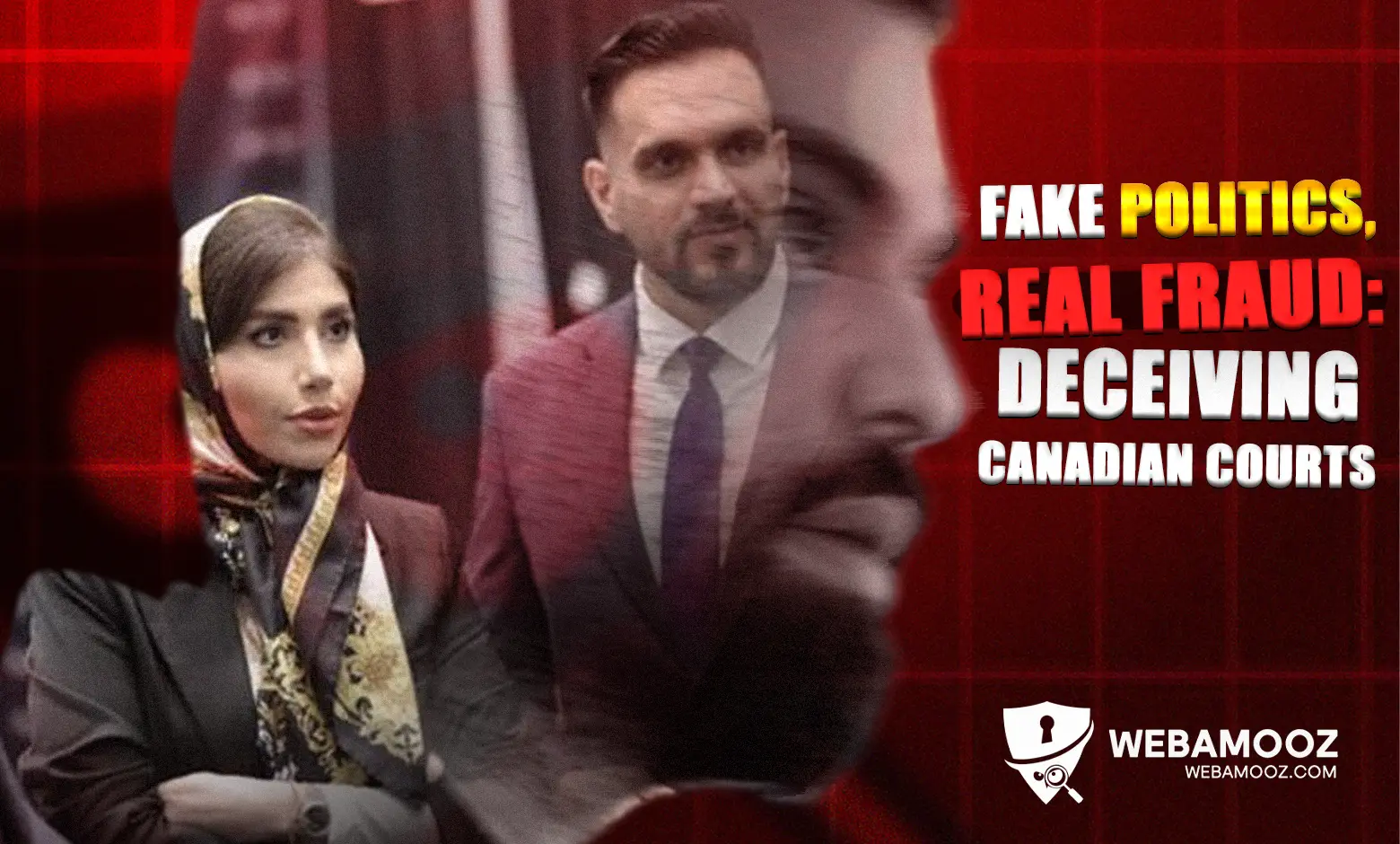
Introduction
Canada’s immigration system is built on values of fairness and protection for the persecuted. But when fraudulent networks manipulate this system using fabricated documents, fake news, and staged political persecution, the integrity of the system is deeply compromised.
One recent and troubling example involves Mozhdeh Shekarisaz, the wife of Ahmad Ayoubi—a key figure in the Iranian-run immigration consultancy Parsi Canada. In an ongoing case at the Federal Court of Canada, Mozhdeh has filed a judicial review application, while the case appears to rely heavily on a fabricated story of political repression involving her husband, Ahmad Ayoubi.
This article uncovers how this network allegedly attempted to deceive Canadian authorities and the courts using staged threats, fake media articles, and tampered legal records.
Case Background – Federal Court of Canada
- Applicant: Mozhdeh Shekarisaz
- Case Type: Immigration and Refugee Matters
- Lead Case File: IMM-17694-24
- Related Files: IMM-17696-24, IMM-17720-24, IMM-17721-24
- Filed On: September 24, 2024
- Court: Federal Court of Canada (Ottawa Office)
- Language: English
- Decision Under Review: Issued by CBSA (Vancouver), dated September 9, 2024
- Judge: Associate Justice Alexandra Steele (approved motion to consolidate all four files on January 14, 2025)
- Status: Under judicial review; no final ruling has been issued
The application contests a decision by Canada Border Services Agency (CBSA), likely involving an immigration denial or deportation. While Mozhdeh is the formal applicant, the case relies on portraying Ahmad Ayoubi as a victim of political repression in Iran—a portrayal that is highly questionable.
Step 1: Public Exposure of the Real Legal Record
On March 12, 2025, independent cybercrime investigator Mohammad Jorjandi hosted a YouTube livestream, exposing that Ahmad Ayoubi’s only legal case in Iran—according to the leaked judicial database Edaalat.org—was a 2021 conviction for smuggling alcoholic beverages.
There was no record of political charges, arrests during protests, or affiliations with opposition groups. This contradicted the narrative being built in Mozhdeh’s immigration case.
Step 2: Creating Fake Online Threats
Immediately after the live stream, a series of threatening comments appeared under the video, referencing Ayoubi’s home address and calling for violence. These comments were posted using newly created accounts—suggesting a deliberate attempt to create an illusion of persecution to support the asylum narrative.
All such comments were deleted by the channel moderator, but their timing raised red flags about potential coordination.
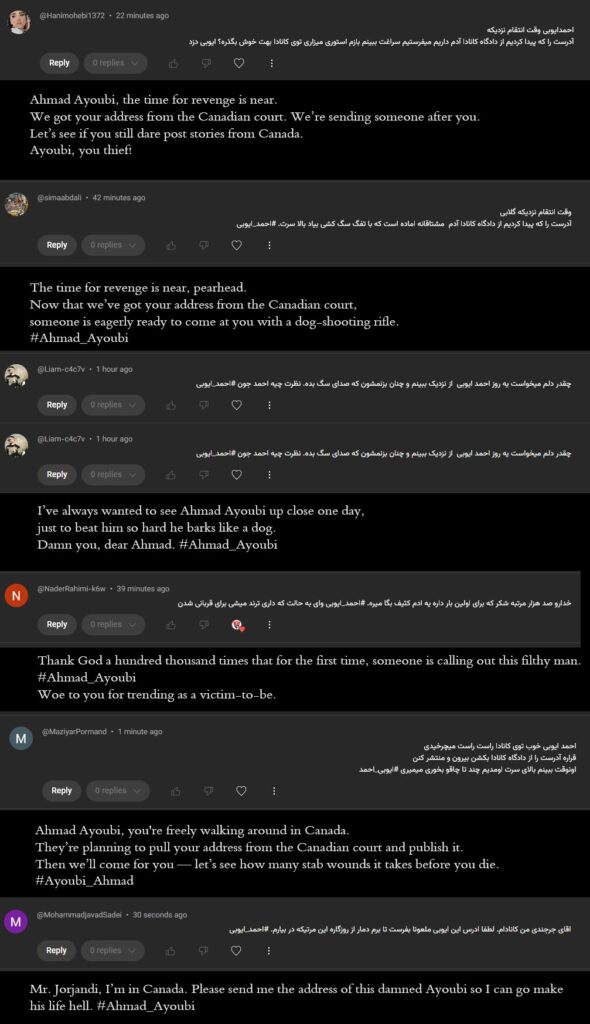
Step 3: Paid Articles to Fabricate a Political Identity
Three days later, on March 15, 2025, several Iranian websites published nearly identical articles describing Ahmad Ayoubi as a political dissident:
“Ahmad Ayoubi, accused of anti-regime activities during the 2019 protests, was arrested and later prosecuted in December 2021 for propaganda against the Islamic Republic.”
These claims did not match any official record. The timing, tone, and repetition of the articles suggested they were paid placements designed to be cited in the immigration case. Archive – Archive – Archive – Archive.
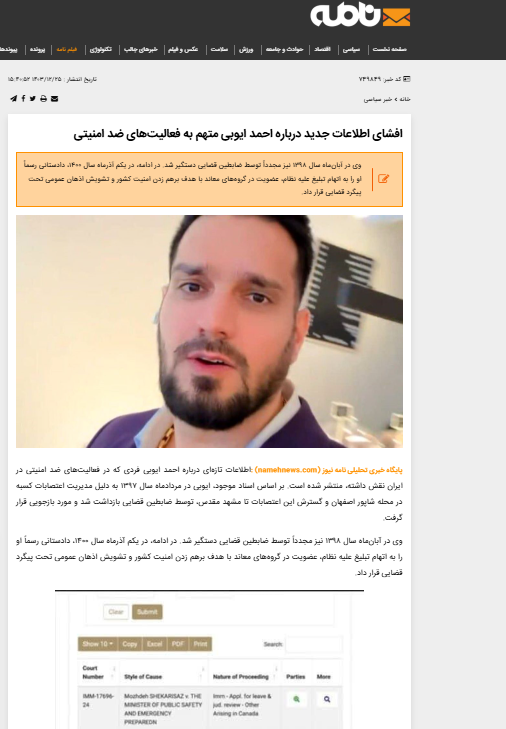
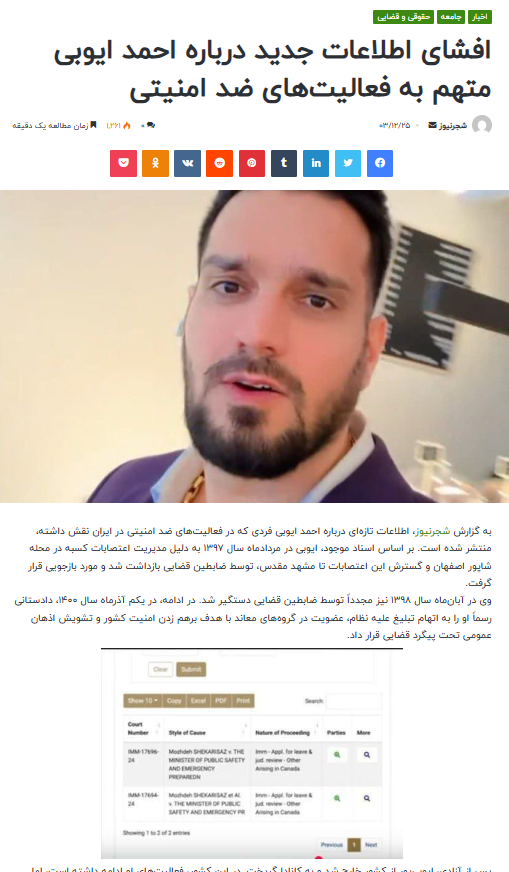
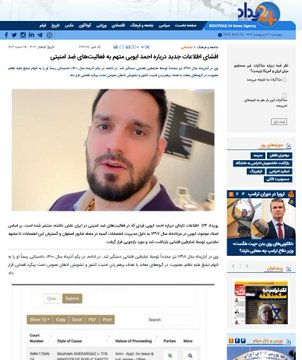
Step 4: Hiding the Real Record
Shortly afterward, Ayoubi’s public legal record mysteriously disappeared from the judiciary portal. With the real charge no longer accessible, the fabricated news articles could now serve as the primary source of background in the case being reviewed by the Federal Court.
This allowed the applicants to present Ahmad Ayoubi not as someone convicted of smuggling, but as a victim of political oppression—despite the fact that the Parsi Canada company continues to operate four active branches in Iran.

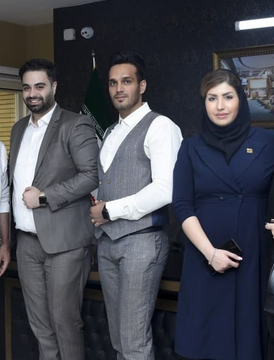
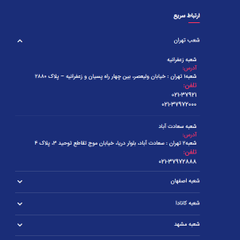

Step 5: Media Campaign to Reinforce the False Image
To strengthen their image in Canada and maintain client recruitment, a sponsored promotional article was released:
“Engineer Ahmad Ayoubi – The Entrepreneurial Journey from Iran to Canada”
This piece was not just reputation management—it was part of a calculated effort to build a dual identity: a political refugee and a business hero. The strategy aims to win both sympathy in court and credibility among potential customers.
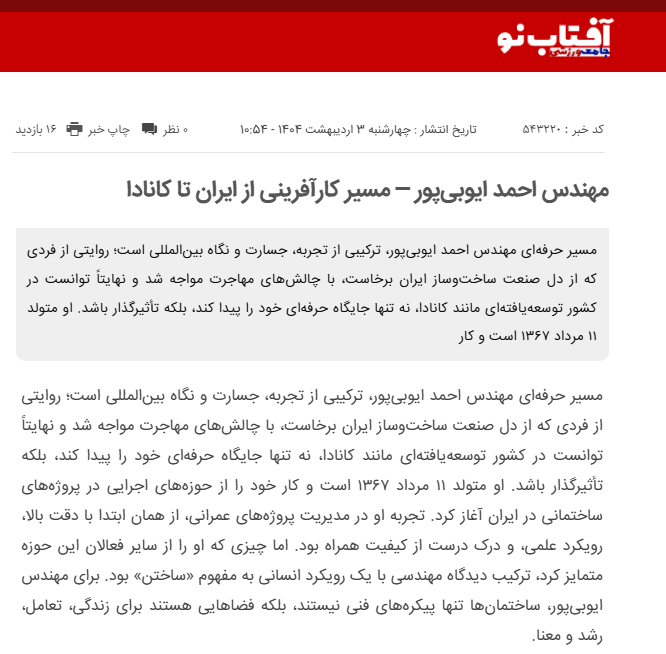
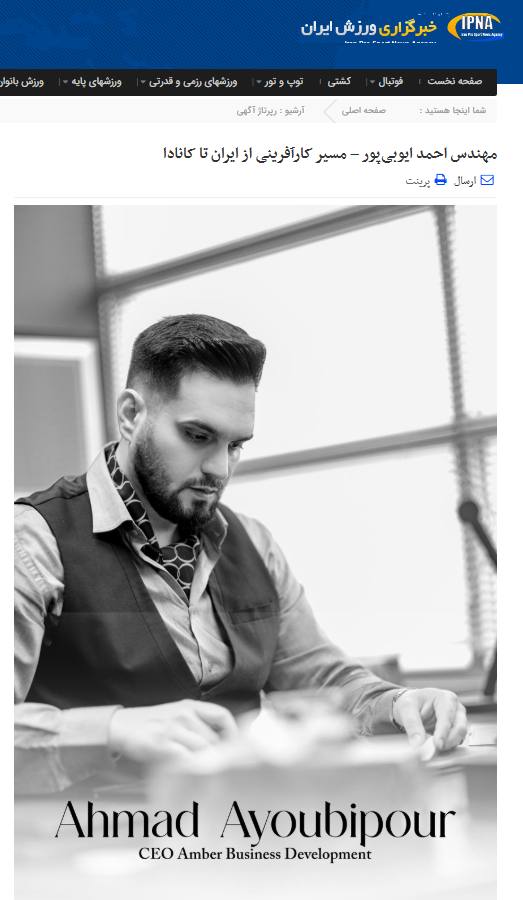
Coordinated Twitter Threat Campaign to Justify Asylum and Target Journalist
Interestingly, on March 14, 2025, a group of Twitter accounts launched a coordinated campaign claiming that Ahmad Ayoubi’s personal address had been exposed and that his life was under threat. These tweets also made explicit reference to a recent livestream by investigative journalist Mohammad Jorjandi, attempting to portray him as a “cyber collaborator” allegedly linked to Iranian intelligence services. This narrative appears to be a deliberate and calculated attempt to discredit Jorjandi, the very journalist who has been actively investigating and exposing the activities of the Ayoubi-Shekarisaz family and their fraudulent immigration business.
What makes this campaign even more revealing is that an analysis of the same Twitter accounts shows that in April 2024, those very accounts had been promoting the business operations of this same criminal family, including public endorsements of the Iranian-based immigration company “Parsi Canada”. Some accounts were also found to have shared promotional content featuring Macan Aria Parsa (Meisam Shokrisaz)—a close associate of the family with a controversial past involving fake certifications and fraudulent education schemes.
This sharp contradiction in messaging—from praising the family’s business ventures to suddenly presenting them as victims of political threats—strongly indicates that these Twitter accounts are part of a coordinated digital operation designed to manufacture a false narrative. The campaign not only aimed to falsify grounds for political asylum, but also to suppress and discredit legitimate journalism by portraying Jorjandi as a government agent rather than a journalist committed to exposing fraud and protecting the integrity of Canada’s immigration system.
“Hasn’t the time come for autonomous retaliation after all these years? Who knows. Maybe somewhere, a fire is already loaded and ready to be triggered.
#Vancouver_Fire
#WeSwearOnTheBloodOfMartyrs”
“Ahmad Ayoubi Pour had cases back in 2009 related to his participation in the 2009 sedition.
One example is published by the Edalat Ali website, where his sentence is clearly documented.
The charges in this case are explicitly stated.”
“Fleeing to Canada:
This so-called civil activist, who was responsible for large-scale real estate union strikes that paralyzed the economic system of the Islamic Republic, has—according to new information—fled to Canada before he could be arrested.
He currently resides there.”
“The location data in images posted to Ahmad Ayoubi’s Instagram clearly show that he has escaped to Canada.”
“A leak by one of the cyber collaborators on YouTube shows that this individual is on the run and has filed a lawsuit in Federal Court of Canada against immigration authorities.
We have submitted a request to the court to obtain documents to determine Ayoubi Pour’s exact place of residence.”
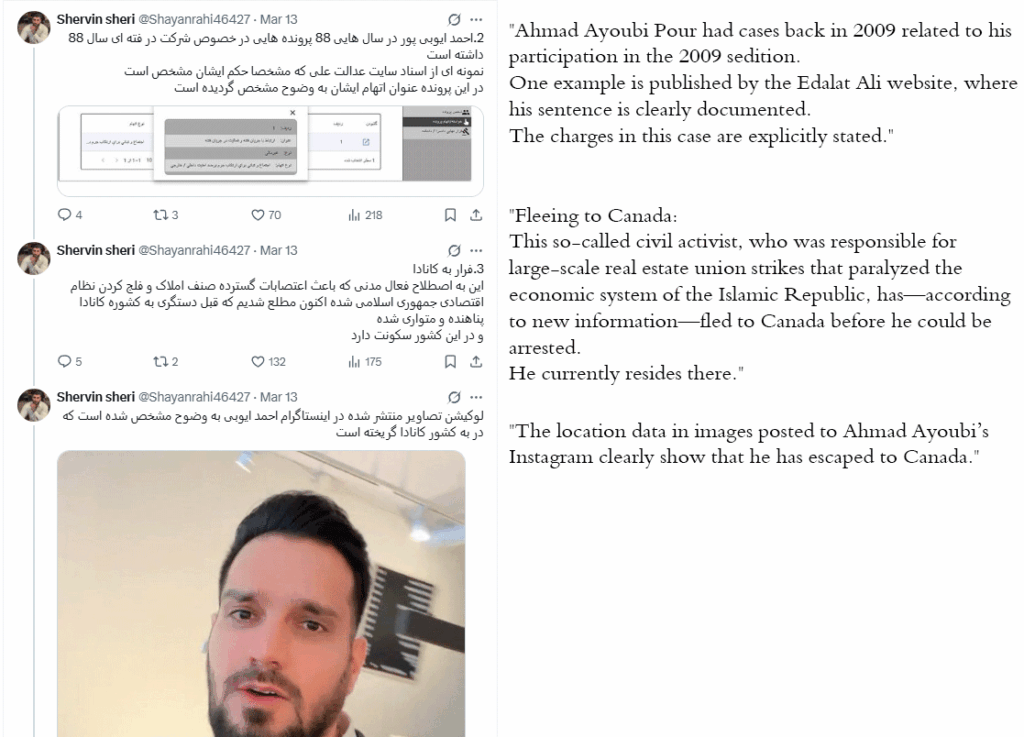
Conclusion
The judicial review case filed by Mozhdeh Shekarisaz illustrates how immigration fraud can be layered, sophisticated, and media-driven. By faking threats, purchasing favorable news coverage, and manipulating access to official records, this network has constructed an asylum claim that may deceive even experienced Canadian judges.
If unchecked, this case could set a precedent for media-based fraud in immigration courts, undermining the credibility of genuine refugee claims.
Call to Action
Independent watchdogs and journalists must continue exposing cases where the immigration system is abused through deception.
The Federal Court of Canada must investigate the legitimacy of the evidence presented, especially fabricated media.
Agencies such as @CanBorder and @CitImmCanada should tighten fact-checking processes for politically based asylum claims.
Update 6/5/2025: Timeline Contradiction Exposes False Arrest Claim
One of the most striking revelations that has recently come to light further dismantles the false political persecution narrative surrounding Ahmad Ayoubi.
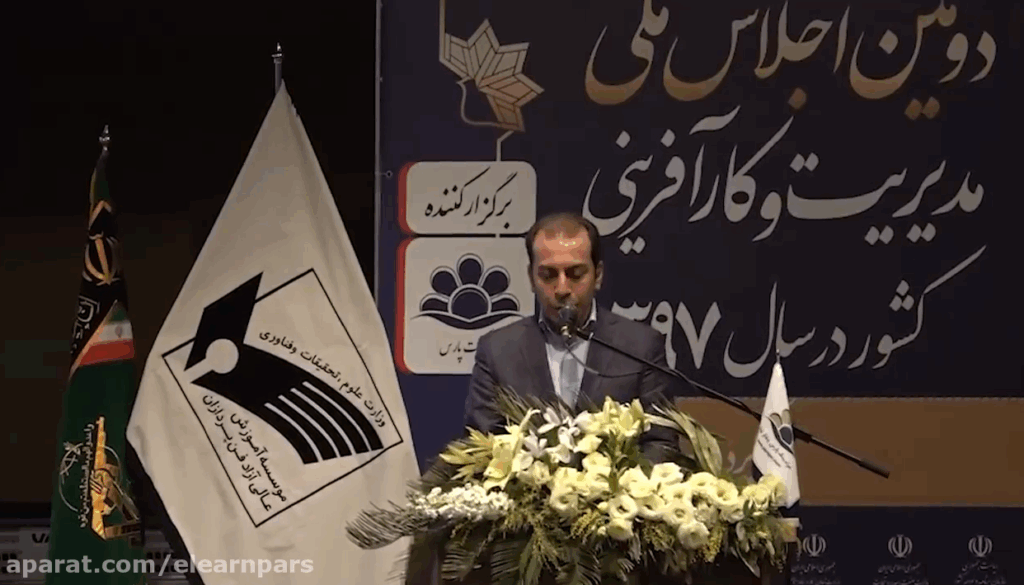
According to claims made in fabricated Persian-language articles, Ayoubi was arrested in August 2018 (Mordad 1397) by judicial authorities for allegedly organizing merchant strikes in the Shapur neighborhood of Isfahan and helping spread unrest to other cities, including Mashhad. This arrest was cited as evidence of political repression in support of his Canadian asylum narrative.
However, video evidence from March 1, 2019 (Esfand 9, 1397) tells a completely different story.
During that time, Ayoubi was not in hiding or suffering persecution. He was publicly honored on stage at the Second National Summit on Management and Entrepreneurship, a high-profile government-affiliated event held in Isfahan to mark the 40th anniversary of the Islamic Revolution.
Footage and photographs from the summit clearly show:
- Ahmad Ayoubi on stage with Mozhdeh Shekarisaz and Meisam (Macan Aria) Shekarisaz, leading the event as organizers.
- Sardar Gerami, commander of the Engineering and Passive Defense Division of the IRGC’s 40th Saheb al-Zaman Corps, presenting a ceremonial garland of flowers to Ayoubi in front of an audience and cameras.
- Official banners displayed behind the speakers included the Pars Pendar Nohad logo and the IRGC flag, highlighting the regime’s sponsorship of the event.
Clear Contradiction
How could a person who was supposedly arrested by the regime in August 2018 be:
- Organizing state-sponsored conferences in early 2019?
- Being publicly honored by senior IRGC officials just months later?
This contradiction exposes the core lie behind the asylum narrative: Ahmad Ayoubi was not a political prisoner or dissident. He was a recognized figure in regime-affiliated business circles, openly supported and celebrated by state institutions.
Final Note: A Calculated Attempt to Deceive the Canadian Court
With this new evidence, it becomes undeniably clear that this network — including Ahmad Ayoubi, Mozhdeh Shekarisaz, and their associates — is attempting to deceive the Canadian immigration system and the Federal Court by constructing an entirely false story of political persecution.
They are not refugees seeking protection — they are fraudsters orchestrating a sophisticated media and legal operation to gain asylum through lies, fake media, and doctored history.
Canada must uphold the integrity of its legal and immigration institutions by thoroughly examining these false claims and rejecting attempts to abuse its humanitarian systems.



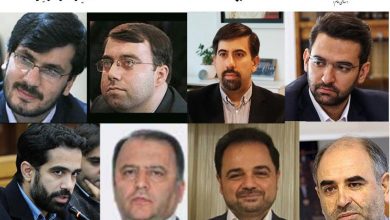
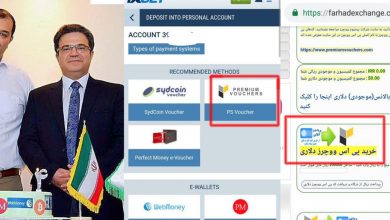

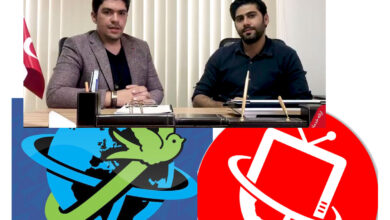
:))
Thank you Jorjandi for all your hard work and bravery over the years 🙏🏼
You’ve helped so many people in Iran see the truth and avoid getting scammed.
We really appreciate everything you do. Keep fighting, we’re with you! 💪🏼🔥